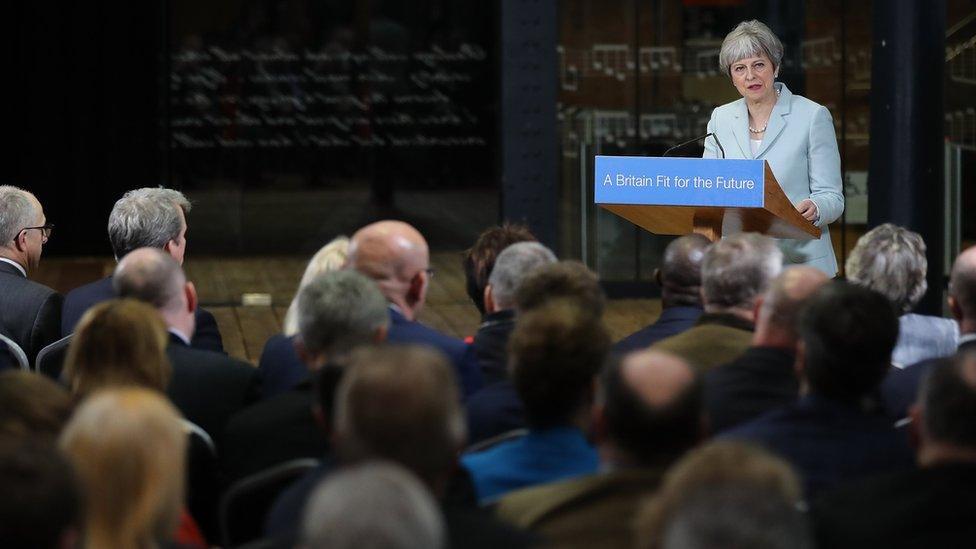What will May do about student fees?
- Published

A library in a thriving college in Derby might have felt like the perfect location for the prime minister's official start of a review of education that has been promised several times before.
She was here to show she wants to act, to sort out one of the problems the country faces. But at half term, the college was largely empty of students, the invited audience largely made up of education bigwigs rather than younger people whose lives might actually be affected by the decisions.
In the unlikely event that Westminster's sketch writers would be short of metaphors the choice of venue and audience perhaps provided a convenient flavour for their spiky paragraphs on Tuesday.
There are plenty of good reasons why the prime minister chose to hold this review. Full time student numbers have gone up and up and up. But so have fees, and the level of debt students face after university in England has multiplied too.
With the scrapping of student maintenance grants, students from less well-off backgrounds are finishing up with higher debts.
The number of students doing part-time courses has dropped significantly, and while good quality apprenticeships and training are often feverishly oversubscribed, there is and has been (certainly in political circles) an assumption that university is the the premium choice for 18-year-olds.
Theresa May wants to get rid of that assumption (although she is certainly not the first prime minister I have heard outline that demand in a speech)
And politically, the Tories are looking for ways to show they are serious about addressing the tension between generations. It may be rather over-eager for any Conservative to imagine they can compete on a big scale with the Labour offer to get rid of fees altogether, but feeling parents' and grandparents' pain too is clearly an aim.
And Theresa May wants to demonstrate there is more to her government than the bureaucratic and political tangle of Brexit.

Full-time student numbers have gone up - but so have fees
Reading that list of motivations - so far, so tempting. But you'd be forgiven for wondering if the review might in the end be, well, as half-empty as the college today.
At times it was as if the prime minister had only just realised, or heard of the problems in higher education when, of course the Tories have been in charge for seven years while fees have gone up.
Many would argue though that the fee increases are in fact the reason why universities have been able to grow so much, and the number-crunchers at the IFS show, external that the best paid graduates pay more of the burden in the long term.
More recently, there have already been very significant reforms to the education sector, in fact on Theresa May's watch. The Department for Education has already pushed for shorter courses and for more information about the quality of degrees to be made available, and new technical qualifications, T-levels, are already on the way.
Moving money around
Since the election Number 10 has already made a few tweaks to the fees system. And while the prime minister emphasised again and again she wants this to be a wide review, its terms of reference (the small print) make clear there won't be a big shift on how education is paid for, nor any big extra promises of cash.
For better or for worse, that means the review appears therefore to be looking at moving money around inside the sector.
That doesn't meant there won't be any change. Cutting the cost of some degrees is on the cards, and there was a heavy hint from the PM that the maintenance grant might come back (one university boss lamented afterwards that the government could just do this straight away rather than spend another year concluding it was a relatively inexpensive no-brainer).
But the review seems unlikely to be recommending massive upheavals, certainly not anything like the demands we heard from students at nearby Derby University today.
It's abundantly crystal clear the Tories won't go near the kind of solution being put forward by the Labour Party that seemed to drive so much support their way in the general election.
Yes, ministers are worried about the way the higher education system works, the levels of debt that some students face.
But don't mistake today's announcement as a sudden Conservative conversion to something completely different. And while there is political opportunity in outlining promises, there are risks that in the end they look empty themselves.